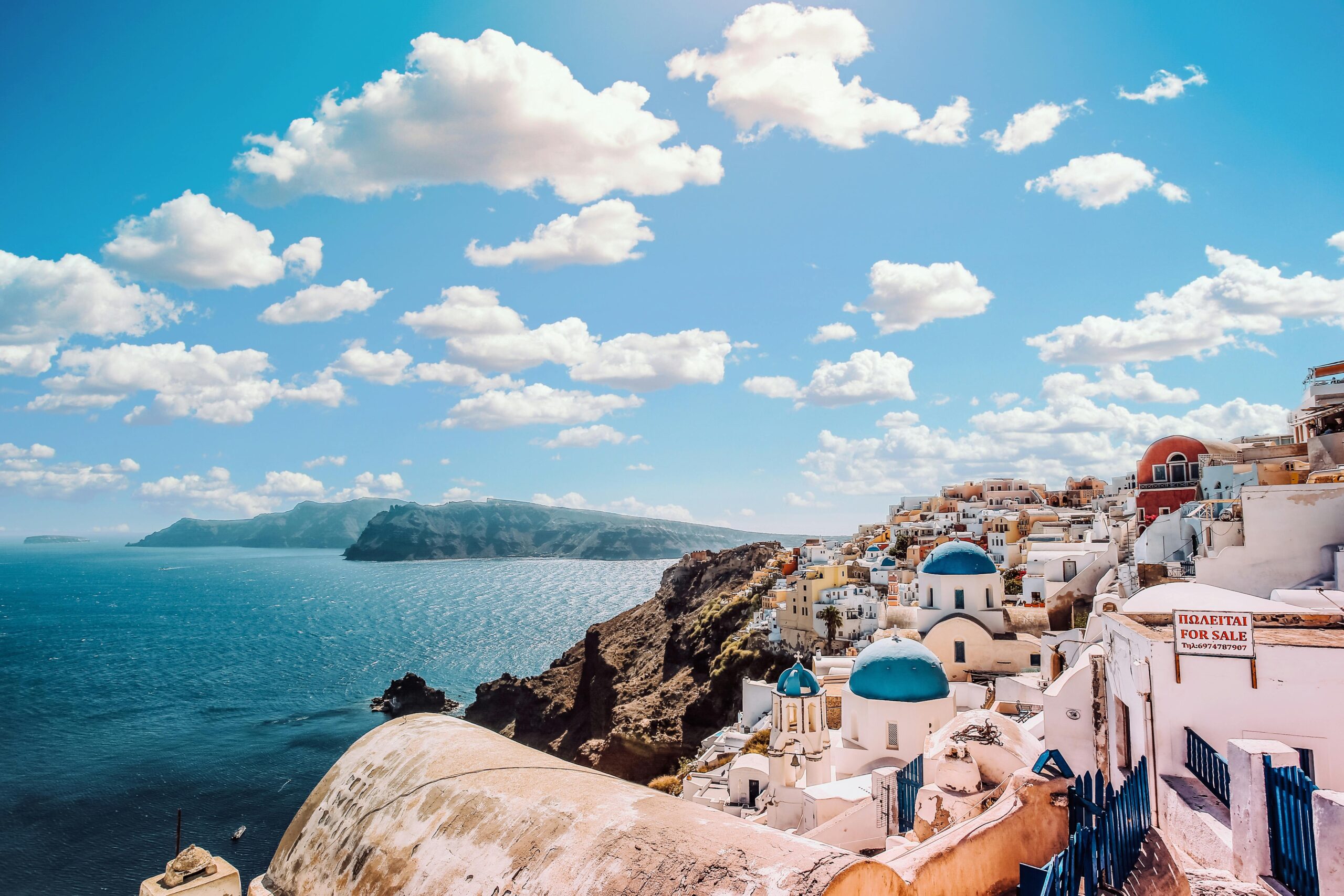Greece is a country that captivates travelers with its stunning landscapes, rich cultural heritage, and ancient ruins. Whether you’re looking to explore the cobblestone streets of Athens, relax on the golden beaches of the Aegean Sea, or immerse yourself in the rich mythology that shaped Western civilization, Greece has something to offer every type of traveler.
Why Choose Greece as Your Next Travel Destination?
Greece offers an irresistible mix of old-world charm and modern vibrancy. From the bustling streets of Athens to the peaceful islands scattered across the Mediterranean, Greece is an eclectic destination that will make your vacation memorable. It’s a country of warm weather, warm-hearted people, and unforgettable experiences.
1. Athens: The Cradle of Western Civilization
Athens, the capital of Greece, is home to some of the most iconic landmarks in the world. Steeped in history, this ancient city was the birthplace of democracy, philosophy, and the arts. With its beautiful temples, grand theaters, and world-class museums, Athens offers a deep dive into the past while embracing the present.
Top Attractions in Athens:
- The Acropolis: The ancient citadel that is home to the Parthenon, one of the most important symbols of ancient Greek civilization.
- The Ancient Agora: The heart of ancient Athens, where philosophers like Socrates and Plato once roamed.
- The National Archaeological Museum: A treasure trove of artifacts from Greece’s ancient past.
To learn more about Athens and plan your visit, head to Visit Athens.
2. Santorini: A Dream Destination in the Aegean Sea
Known for its iconic whitewashed buildings, blue-domed churches, and breathtaking sunsets, Santorini is one of the most sought-after destinations in Greece. This island, which was formed by a volcanic eruption thousands of years ago, is a paradise for those seeking relaxation and romance.
Top Experiences in Santorini:
- Oia Village: Famous for its stunning sunsets and narrow streets filled with boutiques and restaurants.
- Red Beach: A unique beach with red volcanic sand and crystal-clear waters.
- Volcano Tours: Explore the island’s volcanic history by taking a boat tour to the active caldera.
For more tips on visiting Santorini, check out Santorini Tourism.
3. Mykonos: The Party Island with a Rich History
Mykonos is known for its lively nightlife, but the island also offers much more than beach clubs and bars. The island’s quaint streets, traditional windmills, and charming architecture make it a wonderful place to explore during the day. Mykonos is also home to some of the most beautiful beaches in Greece, making it the perfect spot for both partying and relaxation.
Things to Do in Mykonos:
- The Windmills of Mykonos: These iconic windmills offer some of the best views of the island.
- Little Venice: A charming area filled with cafes and bars where you can watch the sunset.
- Delos Island: A short boat trip away, Delos is a UNESCO World Heritage site that is home to ancient ruins.
For more information about Mykonos, visit Mykonos Tourism.
4. Crete: Greece’s Largest Island
Crete is a diverse island that offers everything from ancient ruins to beautiful beaches. It is home to the Minoan Palace of Knossos, which dates back over 3,000 years, and boasts some of the most stunning landscapes in Greece, including rugged mountains and fertile plains.
Key Highlights in Crete:
- Knossos Palace: A historic site that is the center of the Minoan civilization and a must-visit for history enthusiasts.
- Elafonissi Beach: Famous for its pink sand and clear turquoise waters, ideal for swimming and relaxation.
- Samaria Gorge: A dramatic 16-kilometer canyon that offers hikers a challenging and scenic journey through Crete’s wilderness.
Discover more about Crete and its attractions on Crete Tourism.
5. Rhodes: The Island of Knights
Rhodes is one of the largest Greek islands, located in the southeastern Aegean Sea. It is famous for its medieval Old Town, which is a UNESCO World Heritage site, and its sunny beaches. Rhodes is also steeped in history, from the ancient Colossus of Rhodes (one of the Seven Wonders of the Ancient World) to the Knights of St. John, who once ruled the island.
Top Things to See in Rhodes:
- The Palace of the Grand Master: A medieval castle that offers a glimpse into the island’s history.
- Lindos Acropolis: A hilltop fortress offering breathtaking views of the sea.
- The Ancient City of Kamiros: An archaeological site that showcases the ancient ruins of a once-thriving city.
Learn more about visiting Rhodes by visiting Rhodes Tourism.
6. The Greek Cuisine: A Feast for the Senses
Greek cuisine is one of the healthiest and most delicious in the world. It emphasizes fresh ingredients, olive oil, vegetables, and seafood. Some of the most popular dishes to try include:
- Moussaka: A savory casserole made with eggplant, minced meat, and béchamel sauce.
- Souvlaki: Grilled meat (usually pork or chicken) served on skewers with pita bread and salad.
- Baklava: A sweet pastry made of filo dough, honey, and nuts.
For a deeper dive into Greek cuisine and where to find the best food, visit Greek Food.
7. Practical Tips for Traveling to Greece
Greece is a relatively easy country to travel to, with well-developed infrastructure and public transport. Some essential tips include:
- Language: While Greek is the official language, most people in tourist areas speak English. It’s still helpful to learn a few Greek phrases.
- Currency: The official currency of Greece is the Euro (€). ATMs are widely available, and credit cards are accepted in most places.
- Getting Around: Greece has an excellent ferry system that connects its islands. Buses and trains are also available for traveling within the mainland.
Conclusion
From the historic ruins of Athens to the stunning beaches of Mykonos, Greece offers a world of experiences that will captivate every traveler. Whether you’re into history, food, or just soaking up the sun, there’s something for everyone in this Mediterranean paradise. Start planning your trip to Greece today, and prepare to be amazed by its rich history, beautiful landscapes, and warm hospitality.
FAQs About Traveling to Greece
1. What is the best time to visit Greece?
The best time to visit Greece is during the shoulder seasons (spring and fall) when the weather is pleasant, and the tourist crowds are smaller. June to September is the peak tourist season but is ideal for beach lovers.
2. Do I need a visa to visit Greece?
Greece is part of the Schengen Area, so if you’re a citizen of a non-Schengen country, you will need a Schengen visa. For more information on visa requirements, visit Schengen Visa Information.
3. What are the must-see islands in Greece?
Apart from Santorini and Mykonos, other must-see Greek islands include Crete, Rhodes, Corfu, and Naxos. Each offers a unique blend of culture, history, and natural beauty.
4. What is the currency used in Greece?
The currency used in Greece is the Euro (€). Credit cards are widely accepted, but it’s always a good idea to carry some cash, especially when visiting more remote areas.
5. What is the official language of Greece?
The official language of Greece is Greek, but English is widely spoken in tourist areas, hotels, and restaurants.


